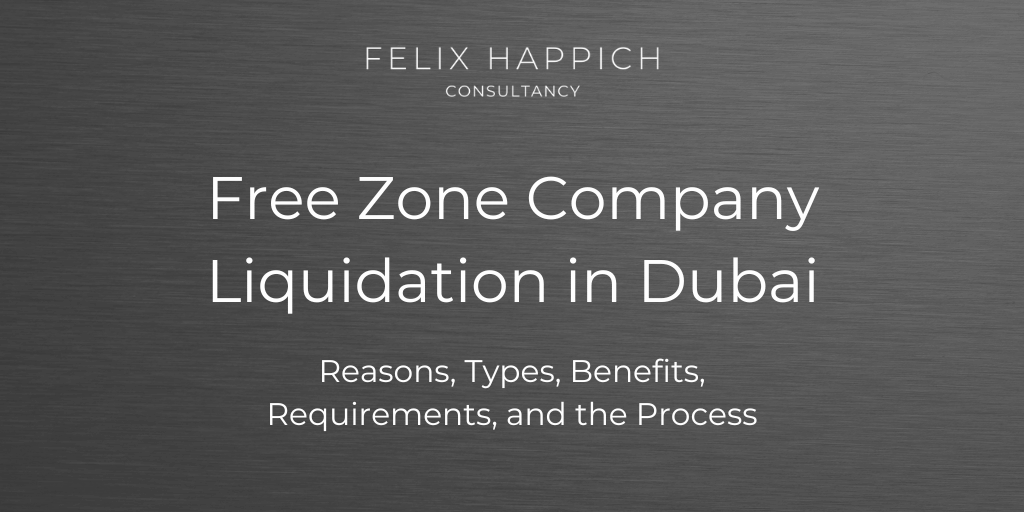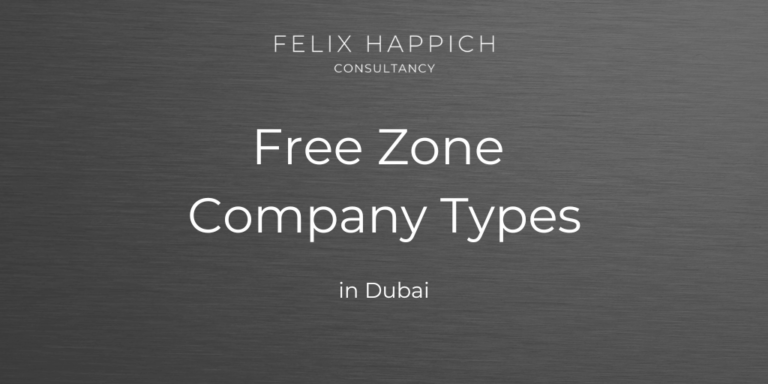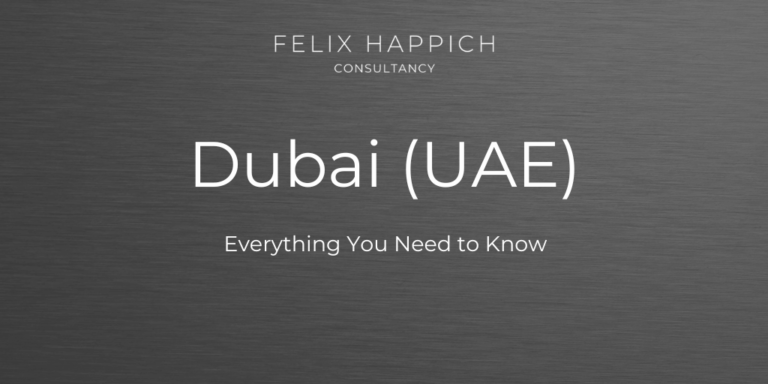Free Zone Company Liquidation in Dubai refers to the legal process of a company’s closure by officially removing the company from the Free Zone records after ensuring that all obligations are cleared. The purpose of company liquidation is to help investors reduce losses after analyzing a shift in business direction or having profitability concerns.
Free zone companies go into liquidation due to various reasons. These include financial difficulties, changes in business strategy, declining profitability, regulatory non-compliance, and the lack of a proper business plan before entering the business. Although all these reasons led the investors to company liquidation, the most common reason is the inability to pay debts.
Free Zone companies’ liquidations are of different types, including Compulsory Liquidation, Creditors’ Voluntary Liquidation, Members’ Voluntary Liquidation, and Provisional Liquidation. The difference between them lies in the reason behind the liquidation and the initiator of the liquidation.
The liquidation of a company has several benefits for investors. The 2 main benefits include protecting businesses from further financial obligations and Equitably dividing remaining assets among shareholders. Along with this, it prevents legal actions and penalties from Free Zone authorities as well as government bodies such as the DED.
Liquidating a company has some requirements that you have to fulfill before you get into the actual liquidation process. These include preparing a resolution for liquidation, hiring a liquidator, performing a financial audit, and submitting other legal documents such as employee agreements, etc. However, the requirements vary based on the company type, business activity, and, finally, the specific free zone.
The process of liquidation of a company seems similar in almost all free zones. You have to follow a legal structure like you have to pay the fee after submitting the required document to get the initial liquidation certificate which is an official approval for initiating the closure of the company and removing it from free zone records. In the article below, our team has combined everything you need to know about Dubai Free Zone company liquidation.
What is Company Liquidation in Free Zone Dubai?
Free Zone Company Liquidation in Dubai is a legal process of deregistering a company or business that is ceasing its operations under Free Zone authority regulations, after fulfilling legal and financial obligations to minimize potential losses.
The process is complete after ensuring the alignment with the specific free zone regulations and the UAE Commercial Companies Law (Federal Law No. 2 of 2015), Federal Law No. 8 of 1984 (Labor Law), and UAE Bankruptcy Law (Federal Law No. 9 of 2016). All these laws are implemented for the safety of the rights of every individual directly attached to the company.
What are the types of Liquidation of a company in the Dubai Free Zones?
The types of company liquidation include Voluntary Liquidation, Compulsory Liquidation, and Administrative Liquidation. These types vary based on the specific legal reason behind the liquidation, the authority undertaking the winding-up process, and the willingness of the owner or shareholders. The 3 main of the liquidation of free zone companies are provided below in detail.
Voluntary Liquidation
Voluntary liquidation is a type of company liquidation where the owner or shareholders decide to close the company operations, sell assets, settle debts, and distribute remaining funds. There are 2 subtypes of voluntary liquidation. These are Members’ Voluntary Liquidation (MVL) and Creditors’ Voluntary Liquidation (CVL).
This type of company liquidation is mostly successful because it includes clear communication, meticulous documentation, and fewer financial complexities between shareholders. The major requirements are shareholder resolutions, declarations of solvency, creditor notices, and tax clearance.
Compulsory Liquidation
Compulsory liquidation of a company in Dubai’s free zones is a type of company liquidation initiated by external parties, such as creditors or regulatory authorities, and mandated by the court due to insolvency, non-compliance, or legal violations. Unlike voluntary liquidation, it is a forced process under the judiciary.
The common reasons for a free zone company’s compulsory liquidation include unpaid debts, regulatory breaches, abandonment, fraud, or mismanagement. Such a liquidation takes 12–24 months to fully remove the company from the free zone’s records. Challenges such as creditor disputes, hidden liabilities, regulatory obstacles, and employee claims require extra legal consultancy.
Administrative Liquidation
Administrative liquidation of a company in Dubai’s free zones is a type of liquidation initiated by the government or free zone authorities to dissolve a company that fails to meet statutory obligations, such as non-renewal of licenses, unpaid fees, or operational violations.
The process begins with non-compliance notices. If you resolve the issue then this will stop the further inquiry however it is not resolved then a liquidation order is issued by the respective authority. A liquidator is appointed to manage the company’s legal procedures such as tax, debts, etc. After this final approval is given to completely remove the company structure and brand identity.
Administrative Liquidation of a free zone company costs include fines, liquidator fees (3–10% of asset value), and deregistration fees. The process typically takes 3–12 months, depending on complexity.
What are the Requirements for Dubai Free Zone Company Liquidation?
The requirements for Liquidating a Dubai free zone company are passing a board resolution, hiring a liquidator, and obtaining clearance certificates from the relevant free zone or government authorities.
Along with this, a public notice announcing liquidation must be published. Finally, the liquidator submits a final liquidation report to the free zone authority. The 7 main requirements are mentioned below
- Board Resolution
- Appointment of Liquidator
- Clearance Certificates
- Visa and Establishment Card Cancellation
- Bank Account Closure
- Public Notification
- Final Liquidation Report
What are the reasons for the liquidation of a free zone company?
The reasons for the liquidation of a free zone company are financial insolvency or continuous operational losses. Changing market conditions or declining demand can force closure. Along with this, shareholder disputes or a strategic decision to exit may also lead to liquidation.
Furthermore, failure to withstand legal regulations or license renewal can result in forced dissolution. In some cases, mergers, acquisitions, or government orders also cause company closure. Below are the nine common reasons that lead a company to the liquidation phase.
- Financial Insolvency
- Operational Losses
- Market Conditions
- Shareholder Disputes
- Strategic Decision
- Mergers & Acquisitions
- Government Orders
- Legal Violations
- License Expiry
How to Liquidate a Company in the Dubai Free Zone?
Company liquidation in the Dubai Free Zone requires following a legal framework. Based on the type of liquidation, you must take a different approach. The process may vary slightly from one Free Zone to another, depending on the type of liquidation. However, the main steps remain the same which are provided below.
Making a Board Resolution
A Board Resolution for Free Zone Company Liquidation is a formal document for the confirmation of the shareholders’ or directors’ decision to dissolve the company. It includes approval of liquidation, appointment of a licensed liquidator, and authorization for necessary actions such as obtaining clearance certificates, canceling visas, and closing bank accounts.
Appoint a Liquidator
Appointing a licensed liquidator is necessary for the free zone company liquidation process. The liquidator must be an approved audit or accounting firm registered in the UAE. A formal appointment letter or board resolution must be issued, confirming the liquidator’s role. The liquidator prepares a final audit report, which is submitted to the free zone authority for approval.
Obtain Clearance Certificates
Obtaining clearance certificates confirms that the company has no outstanding liabilities that can cause any issues in the liquidation process. These certificates are provided by the Free Zone Authority and Dubai government departments associated with business such as the Visa & Immigration Department, Dubai Customs, the Corporate Bank, etc.
Cancel Visas & Establishment Card
Once you obtain the necessary clearance from relevant authorities then you have to cancel all visas and the establishment card to avoid future liabilities. The steps include:
- Cancel all employment visas issued under the company through the free zone authority and the General Directorate of Residency and Foreigners Affairs (GDRFA).
- Removed all the dependents from the sponsorship you have offered.
- Submit a request to the immigration authority to cancel the company’s establishment card.
Close Bank Accounts
Closing a corporate bank account is a must to ensure no financial obligations remain linked to the company. Once you fulfill all the requirements, the bank will issue an official account closure certificate, which must be submitted to the free zone authority.
Publish Public Notice
A public notice is the official announcement of the company’s closure. It allows creditors to raise any claims. The notice must be published in both English and Arabic in a UAE-based newspaper. It should include the company name, license number, liquidation date, and liquidator’s details. However, after publishing the public notice, you must wait for a 45-day notice period for any objections. The liquidation process proceeds smoothly once the period expires with no claims.
Submit Final Liquidation Report
The final liquidation report is the final legal document that confirms the company has completed all legal and financial obligations. It is prepared by a licensed liquidator who compiles a detailed audit report. The liquidator submits the report, along with the required documents, to the free zone authority for final approval.
Obtain Final Approval
Once the liquidator submits the final liquidation report, the free zone authority will review it. You will get a final closure certificate if no objection is made by the specific free zone authority on the report. This certificate officially allows for the dissolution of the company in accordance with UAE regulations.
How long does it take to get a free zone company liquidated?
The liquidation process for a free zone company in the UAE typically takes 45 to 60 days. However, it depends on the company’s compliance and the efficiency of the required formalities.
How much does it cost to liquidate a free zone company?
The cost ranges from AED 6,000 to AED 28,000 as per our experts. However, the actual cost can vary based on different factors, including the specific free zone, the company type, and the liquidation type as mentioned in the table. Below is the average estimated cost for the 3 main types of liquidation
| Type of Liquidation | Cost Range (AED) |
| Voluntary Liquidation | AED 6,000 to AED 25,000 |
| Compulsory Liquidation | AED 8,000 to AED 28,000 |
| Administrative Liquidation | AED 5,000 to AED 20,000 |
What are the best strategies to prevent company liquidation?
Avoiding liquidation starts with a strong foundation. A well-structured business setup in a Dubai free zone provides tax benefits, operational flexibility, and growth opportunities. To sustain success, businesses must manage finances effectively, control costs, and reinvest strategically. Diversifying revenue streams, leveraging technology, and staying adaptable to market trends further enhance stability. With the right approach from setup to scaling, companies can minimize risks and build long-term resilience.
Who is a Liquidator?
A liquidator is a licensed professional. The license can be related to Chartered Accountant (CA), Certified Public Accountant (CPA), Certified Insolvency and Restructuring Advisor (CIRA), Certified Turnaround Professional (CTP), or legal qualifications. He has to manage the process of company liquidation. The liquidator’s role involves settling the company’s debts, selling assets, and distributing the proceeds to creditors. In short, he has to ensure all legal and financial obligations are met before dissolving the company.
What is the role of a liquidator in company liquidation?
The role of a liquidator in company liquidation is to oversee and manage the entire process in compliance with legal regulations. He has to ensure all liabilities are settled, assets are sold, and the company is formally dissolved. Additionally, he minimizes risks and avoids personal liability for directors.
Do I need to appoint a liquidator?
Yes, you need to appoint a liquidator as it is a legal requirement for the liquidation of a company. Additionally, without a liquidator, your company may face difficulties in completing the liquidation process. If you need help our experts are here to settle everything for you with minimal cost.






